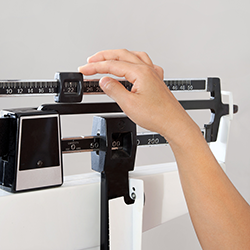- Calls to this hotline are currently being directed to Within Health, Fay or Eating Disorder Solutions
- Representatives are standing by 24/7 to help answer your questions
- All calls are confidential and HIPAA compliant
- There is no obligation or cost to call
- Eating Disorder Hope does not receive any commissions or fees dependent upon which provider you select
- Additional treatment providers are located on our directory or samhsa.gov
Inpatient Weighing of those in Eating Disorder Treatment

The concept of weighing patients in eating disorder treatment must be dealt with sensitively. Due to the propensity this creates for turmoil among patients, there is a great deal of debate in the field regarding the particulars of weighing patients and whether or not their weight should be made known to them.
Why Weighing is Necessary to ED Treatment
While eating disorder treatment strives to teach patients how to de-emphasize weight, it is crucial for the treatment team to know the weight. Treatment team members cannot appropriately monitor physical safety without knowing the patient’s weight.
Weighing can be particularly important for patients engaging in weight restoration as a necessary step in early recovery. Each individual’s body works differently, and their history of disordered eating, exercise, and numerous other factors can impact weight restoration.
Weight can indicate how a particular patient’s body is reacting to the current meal plan and provide information for the treatment team to refine treatment to that specific individual.
Open Weighing
 In an “open weigh,” the therapist and individual are together when the individual is weighed. In order to avoid avoidance of weight knowledge, the individual’s weight is read out loud.
In an “open weigh,” the therapist and individual are together when the individual is weighed. In order to avoid avoidance of weight knowledge, the individual’s weight is read out loud.
As one study explains, open weighing is “grounded in the belief that repeated exposure to one’s weight reduces patients’ fear of being weighed and/or knowing their weight [1].”
Additionally, those proponents of open-weighing believe that it provides an opportunity to modify the “broken cognition” many eating disorder patients have that consuming calorie-dense foods leads to exponential and uncontrollable weight gain [1].”
Blind Weighing
Blind weighing is just as it sounds – the patient is not informed of their weight throughout their time in treatment. The motivation behind this is the “desire to minimize anxiety and distress that may result from patients seeing their weight (especially when it increases), reduce the patients’ focus on the specific number on the scale, and expose patients to weight uncertainty [1].”
Impacts on Treatment Effectiveness
It is important to note that even the impacts of blind or open weighing on treatment are debated. Two of the most evidence-based and supported treatments for eating disorders, Cognitive Behavioral Therapy and Family-Based Treatment, advocate for open weighing [1].
However, “specific and compelling evidence demonstrating that open weighing is preferable for patient outcomes is lacking [1].” Treatment professionals themselves seem to be evenly split, with approximately 50% engaging in open weighing and the other 50% engaging in blind weighing [1].
Studies do indicate that professional usage of either depends on the severity of the patient’s disorder, as blind weighing is used more often with patients in the acute stages of treatment or experiencing cognitive or emotional impairment due to their disorder [1]. A recent study found that patients reported blind weighing decreased their anxiety and eating disorder psychopathology. It also increased their treatment responsively [1].
Additionally, patients shared that “relinquishing control over their weight facilitated body trust and was a necessary step towards recovery. Participants found that not knowing their exact weight helped challenge their overconcern with weight [1].”
Even so, patients felt that lack of support post-discharge was a challenge of blind-weighing and that open-weighing as treatment progressed was viewed as “more suitable [1].” It seems both blind weighing and open weighing have a place in the progression of eating disorder treatment and that the impacts of either can be an effective treatment tool.
Resources:
[1] Froreich, F. V., Ratcliffe, S. E., Vartanian, L. R. (2020). Blind versus open weighing from an eating disorder patient perspective. Journal of Eating Disorders, 8:39.About the Author:
 Margot Rittenhouse, MS, PLPC, NCC is a therapist who is passionate about providing mental health support to all in need and has worked with clients with substance abuse issues, eating disorders, domestic violence victims, and offenders, and severely mentally ill youth.
Margot Rittenhouse, MS, PLPC, NCC is a therapist who is passionate about providing mental health support to all in need and has worked with clients with substance abuse issues, eating disorders, domestic violence victims, and offenders, and severely mentally ill youth.
As a freelance writer for Eating Disorder Hope and Addiction Hope and a mentor with MentorConnect, Margot is a passionate eating disorder advocate, committed to de-stigmatizing these illnesses while showing support for those struggling through mentoring, writing, and volunteering. Margot has a Master’s of Science in Clinical Mental Health Counseling from Johns Hopkins University.
The opinions and views of our guest contributors are shared to provide a broad perspective on eating disorders. These are not necessarily the views of Eating Disorder Hope, but an effort to offer a discussion of various issues by different concerned individuals.
We at Eating Disorder Hope understand that eating disorders result from a combination of environmental and genetic factors. If you or a loved one are suffering from an eating disorder, please know that there is hope for you, and seek immediate professional help.
Published November 12, 2020, on EatingDisorderHope.com
Reviewed & Approved on November 12, 2020, by Jacquelyn Ekern MS, LPC

The EatingDisorderHope.com editorial team comprises experienced writers, editors, and medical reviewers specializing in eating disorders, treatment, and mental and behavioral health.

